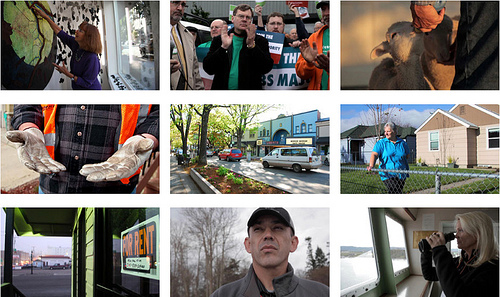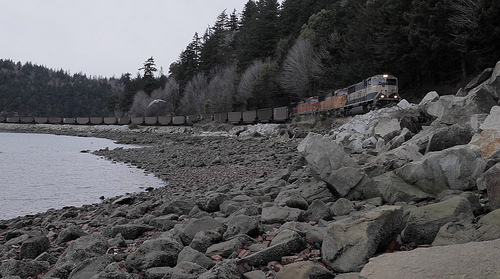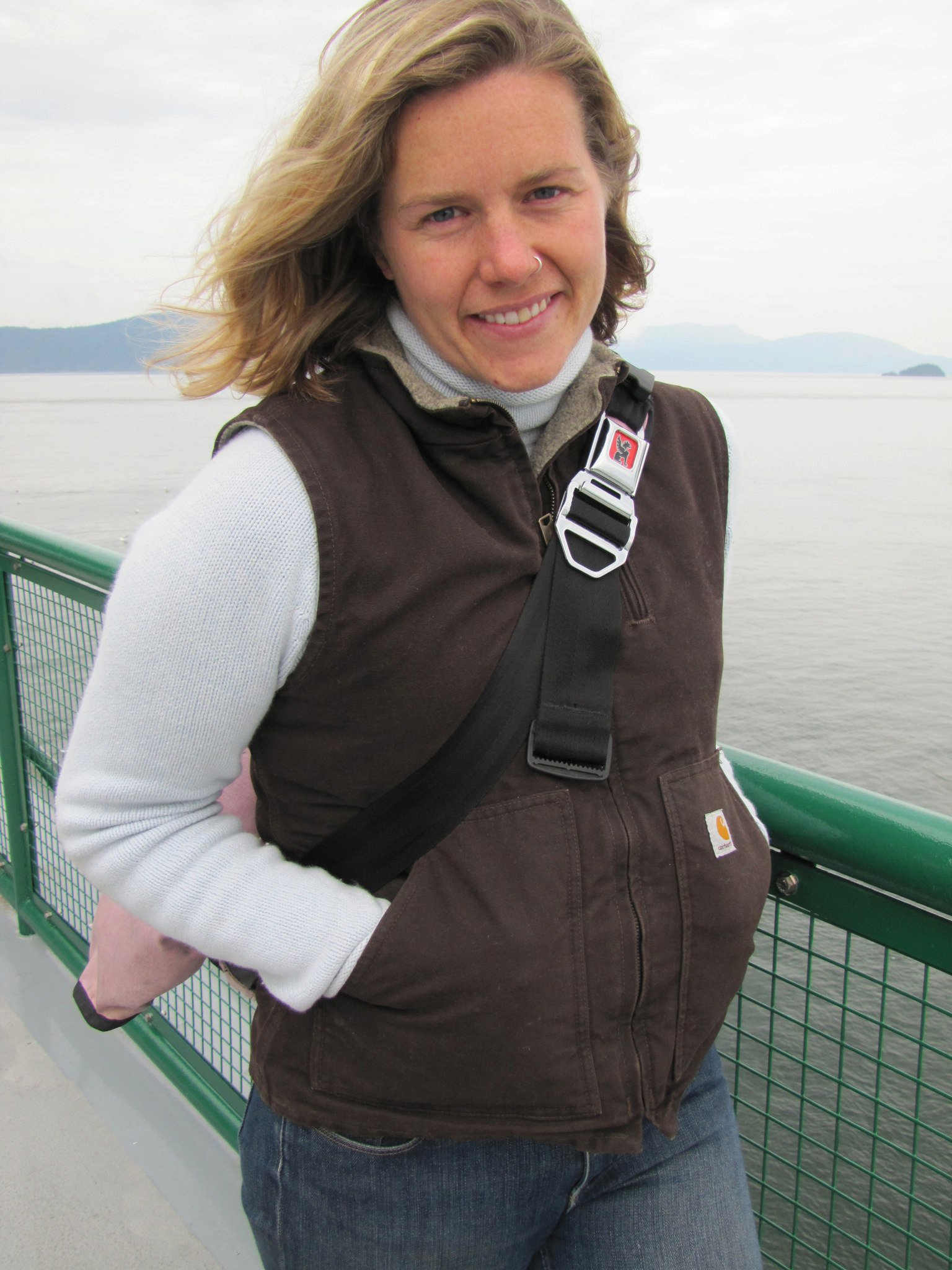Coal Loses Ballot Test
Air Date: Week of November 15, 2013

The proposed coal terminals have been extremely controversial. Earthfix’s Voices of Coal project documents what everyday people in the Pacific Northwest think about the project. (photo: Earthfix)
County council elections turn on local issues, but the recent ballot in Washington State's Whatcom County drew big money and national interest. As Ashley Ahearn of public media's EarthFix reports,these councillors must approve any permit for a huge coal export facility, and those elected are considered by many to be opponents of such a coal terminal.
Transcript
CURWOOD: It's Living on Earth, I'm Steve Curwood. Local elections can have national implications, and nowhere is that more obvious this year than the results of a seemingly obscure election in Washington state’s Whatcom County. The focus is on the Whatcom County Council because it will eventually decide whether or not to approve the largest of the proposed coal export terminals on the West coast. Reporter Ashley Ahearn of the public media collaborative EarthFix followed this election closely, and she’s on the line now. Welcome back to Living on Earth.
AHEARN: Hey, Steve.
CURWOOD: So, some press accounts say that race in Whatcom County was a race between those who are in favor of developing a massive coal export terminal there and those who are against it. Was it that clear?
AHEARN: You know, the thing about county council members and county council elections is the county council is a semi-judicial body that’s supposed to be nonpartisan and will ultimately make decisions about the permits for the docks for the Gateway Pacific Terminal, and as you know, that’s the largest coal export terminal on the west coast. And so, the interesting thing to watch in this campaign season was that the candidates were all talking about the coal terminal, but they weren’t allowed to come out directly and say how they would vote on it because they didn’t want to sort of reveal their hand as semi-judicial members of this council eventually.

Trains bring coal from Wyoming to the Pacific Northwest Coast (photo: EarthFix)
So you had this interesting thing happening where there was code for how they might vote. People would say things like, “Well, I’m pro-development or pro-jobs or I’m pro-environment, pro-conservation.” And you had to kind of interpret that as how they might vote on the terminal. That being said, the money followed a very clear line. There were four candidates who were backed by the Republican party and a PAC that was funded by coal company money and terminal company money. And then there were four candidates that were backed heavily by Whatcom Democrats and the Washington Conservation Voters. So the money, I think, shows a clear picture when it comes right down to it.
CURWOOD: Let's talk about the money that’s involved here. County council is not typically a race that gets much attention, or money, for that matter. But I gathered that's not what happened there. How much was spent on this race, overall?
AHEARN: Well, to give you some context, the average county council member will spend $20,000 to $30,000 to get elected, and there was close to a million dollars spent on this campaign total for four candidates. So we’re looking at $250,000, $200,000 per candidate in fundraising and spending to win this election, and it was pretty interesting to see where the money was coming from, and perhaps most interestingly in terms of campaign finances, more money came in from the environmental side than from the coal company or fossil fuel industry side.
CURWOOD: But when you add it all up, Ashley, this election was about coal?
AHEARN: You know, I think it depends on who you ask. For Washington Conservation Voters, this was very clearly an election that’s about coal, and they have said this was one of the most important elections for them in the state, and some have said nationally, for any environmental group that is watching climate change issues on the ballot, was this Whatcom County council election. And so, when I talked to Brendon Cehovic, he’s the Executive Director of Washington Conservation Voters, he made it pretty clear that, yes, this was indeed about the coal export issue and climate change largely.
CEHOVIC: Look, we have four candidates who just lost their jobs because they supported coal exports in the northwest. If I was an elected official anywhere in the state, I would pick my head up and notice that.
AHEARN: But then on the more conservative, pro-development side, you have this PAC known as Save Whatcom which is funded by coal companies and terminal companies - majority funding is coming from those groups. And I talked to Kris Halterman, the head of the PAC, and she said coal wasn't the biggest issue, and the environmentalists used it to steal the election.
HALTERMAN: The money bought the election and painted a picture of the candidates that we supported as being they would vote for coal when what they would do was stand up and fight for the residents and the community and the property owners of Whatcom County.
CURWOOD: OK, Ashley, so did money buy this election?
AHEARN: Short answer, yes. The candidates that had more money spent on them won the election, and those were the four environmental candidates. Long Answer, yes, but there was a huge grassroots effort that helped those candidates win the election. The environmental side definitely outdid the pro-coal side, or pro-development side in this campaign in terms of just sheer numbers of doors knocked on, phone calls made. Whatcom County Democrats and Washington Conservative Voters made more than 47,000 phone calls and knocked on more than 26,000 doors. That’s a lot of doors in a pretty rural and small county.
CURWOOD: So when does this council actually weigh in on the coal terminal?

Ashley Ahearn covers science and the environment for KUOW and EarthFix, a multimedia reporting project based in the Northwest. (Photo: EarthFix)
AHEARN: I mean, that’s the funniest thing in all of this I think is the environmental impact, the environmental review for the Gateway Pacific Terminal has begun, but it could take more than two years for that to be completed. So these county council members may not be voting on these permits for the docks at Cherry Point where the terminal will be built for more than two years.
CURWOOD: Will they still be in office or is there another election to go?
AHEARN: Well, if there is you can be sure it will be getting just as much attention as this one did.
CURWOOD: That's reporter Ashley Ahearn of the public media collaborative EarthFix. And by the way, we must congratulate Ashley on recently winning a AAAS Kavli Journalism Certificate of Merit for her series on coal dust.
Links
Listen to Ashley’s EarthFix piece on the Washington elections
Living on Earth wants to hear from you!
Living on Earth
62 Calef Highway, Suite 212
Lee, NH 03861
Telephone: 617-287-4121
E-mail: comments@loe.org
Newsletter [Click here]
Donate to Living on Earth!
Living on Earth is an independent media program and relies entirely on contributions from listeners and institutions supporting public service. Please donate now to preserve an independent environmental voice.
NewsletterLiving on Earth offers a weekly delivery of the show's rundown to your mailbox. Sign up for our newsletter today!
 Sailors For The Sea: Be the change you want to sea.
Sailors For The Sea: Be the change you want to sea.
 The Grantham Foundation for the Protection of the Environment: Committed to protecting and improving the health of the global environment.
The Grantham Foundation for the Protection of the Environment: Committed to protecting and improving the health of the global environment.
 Contribute to Living on Earth and receive, as our gift to you, an archival print of one of Mark Seth Lender's extraordinary wildlife photographs. Follow the link to see Mark's current collection of photographs.
Contribute to Living on Earth and receive, as our gift to you, an archival print of one of Mark Seth Lender's extraordinary wildlife photographs. Follow the link to see Mark's current collection of photographs.
 Buy a signed copy of Mark Seth Lender's book Smeagull the Seagull & support Living on Earth
Buy a signed copy of Mark Seth Lender's book Smeagull the Seagull & support Living on Earth

